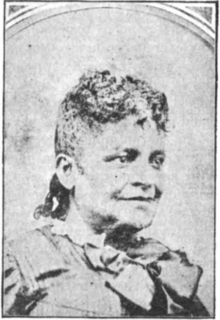Naomi Anderson

Naomi Bowman Talbert Anderson (March 1, 1863 – ?) was a black suffragist who advocated for equal rights for all genders and races in the 1870s.[1] She wrote poetry and gave speeches highlighting the experience of African American women who were still enslaved by their inability to vote, receiving considerable praise from other suffragists for her contributions to the movement.[2]
Early life and education
Anderson was born to free black parents in Michigan City, Indiana.[3] Her mother cared about her education, and when she was unable to attend the all-white schools in town, she hired private tutors.[1] Her mother died in 1860, and Anderson's father did not place the same emphasis on education, keeping her from attending college.[3]
Women's suffrage and advocacy
Anderson volunteered with the International Organization of Grand Templars in Chicago and later the Women's Christian Temperance Union to promote temperance.[3] Soon, she began speaking about women's suffrage, beginning at the first Woman's Rights Convention in 1869.[1] In 1892, she worked alongside white suffragists to campaign for one of the nation's first state woman suffrage referendums.[3]
When Anderson lived in San Francisco in the 1890s, she lobbied the state legislature in favor women's suffrage. Activists Susan B. Anthony and Elizabeth Cady Stanton both praised her contributions to the movement.[3] Anderson's rhetoric spoke to previously enslaved men and asked them to acknowledge that African American women would continue to be enslaved until they received the right to vote.[2]
References
- 1 2 3 Carter, Linda M. (1996). Notable Black American Women, Book 2. Detroit: Gale Research Inc. pp. 11–12. ISBN 0810391775. Retrieved 24 September 2014.
- 1 2 Mead, Rebecca J. (January 1, 2006). How the Vote Was Won: Woman Suffrage in the Western United States, 1868–1914. New York: New York University. p. 89.
- 1 2 3 4 5 Hine, Darlene Clark. "Anderson, Naomi". Facts On File Encyclopedia of Black Women in America: The Early Years, 1617–1899. Facts on File, Inc. Retrieved 24 September 2014.